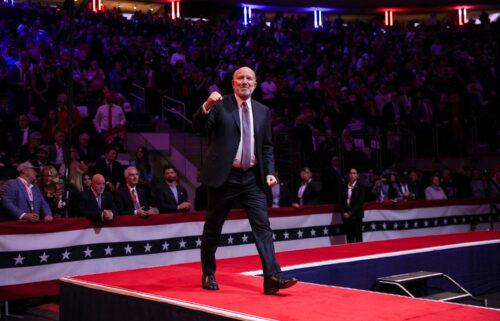Argentina’s Milei tells Davos ‘heroes’ how it should be done
By Anna Cooban, CNN
London (CNN) — Barely six weeks into his term, Argentina’s new libertarian, chainsaw-wielding president has laid out his vision on a global stage, assuring the world’s business leaders that his country is their “staunch, unconditional ally.”
“I would like to leave a message for all businesspeople here… you are social benefactors, you’re heroes,” Javier Milei said Wednesday in a speech at the annual meeting of the World Economic Forum in Davos, Switzerland.
“Let no one tell you that your ambition is immoral. If you make money, it’s because you offer a better product at a better price.”
The political outsider and self-declared “anarcho-capitalist” won Argentina’s presidential election in November, following an unconventional campaign full of big promises to overhaul the country’s beleaguered economy. He famously brandished a chainsaw at several of his rallies as an illustration of his plans to slash public spending.
Milei has made stamping out hyperinflation his top priority. Year-on-year inflation in Argentina topped 211% in December, the highest level in more than three decades.
Now, in Davos, and sans chainsaw, Milei argued that what he called “socialism” had done nothing but plunge Argentina into poverty, and that free-market capitalism was the only system that could generate true prosperity — both for his country and others.
“The case of Argentina is an empirical demonstration that — no matter how rich you may be, or how much you may have in terms of natural resources… or how many bars of gold you may have in the central bank — if measures are adopted that hinder the free function of markets, free competition, free price systems, if you hinder trade, if you attack private property, the only possible fate is poverty.”
Since former Argentine President Juan Peron came to power in the 1940s, backed by the country’s labor unions and working class, Argentina’s dominant political ideology has been characterized, in part, by heavy state intervention in the economy, according to an assessment by the Council on Foreign Relations, a US think tank.
On Tuesday, Reuters reported that Milei had openly criticized what he labeled the “socialist agenda” of the World Economic Forum to reporters traveling with him on a commercial flight to Switzerland.
Kristalina Georgieva, the head of the International Monetary Fund, told CNN’s Richard Quest Wednedsay that she welcomed Milei’s radical agenda.
“The Argentine economy is in such bad shape that it has to be shaken up. President Milei and his team are doing exactly that,” she said during an interview in Davos.
The IMF said last week that it could release $4.7 billion from its $44 billion loan program with Argentina, provided certain conditions were met.
Radical reform
Since taking office, Milei has announced a raft of public spending cuts and asked lawmakers to sign off on a sweeping program of deregulation that scraps protections for businesses and consumers and makes it easier to privatize public companies. Thousands in Argentina have taken to the streets in protest.
He has also devalued Argentina’s currency. On Wednesday, the Argentine peso was trading at almost 819 to the US dollar, from 366 the day before the measure was introduced in mid-December.
The devaluation has come with “painful consequences,” Kimberley Sperrfechter, an emerging markets economist at Capital Economics, told CNN. Following its surge in December, inflation will “probably continue to rise up in the coming months,” she said.
However, some of Milei’s measures, such as the devaluation, are also likely to stabilize Argentina’s economy in the medium term, Sperrfechter said. A weaker currency, for example, tends to make countries’ exports more competitive on the global market.
“Argentina has this convoluted exchange rate regime… the currency is too strong,” she said.
Among his most radical plans, Milei has pledged to ditch the peso as Argentina’s official currency and replace it with the US dollar.
Such a move would prevent Argentina’s central bank from printing more pesos to help the government continue paying interest on its debt and avoid default — something it has done for years — and effectively hand the reins of monetary policy over to the US Federal Reserve. It’s a step other countries have taken, just none the size of Argentina.
But talk of dollarization has cooled off over the past few weeks, Sperrfechter noted, as Milei has preferred to concentrate on institutional reforms.
The-CNN-Wire
™ & © 2024 Cable News Network, Inc., a Warner Bros. Discovery Company. All rights reserved.


